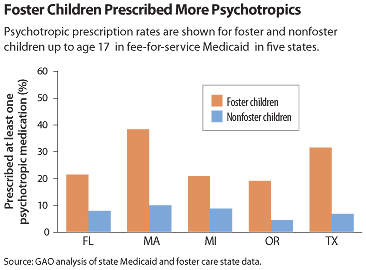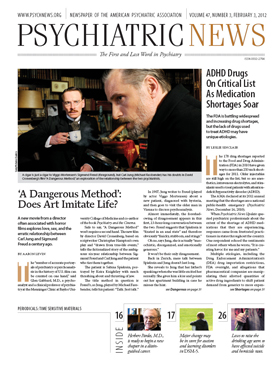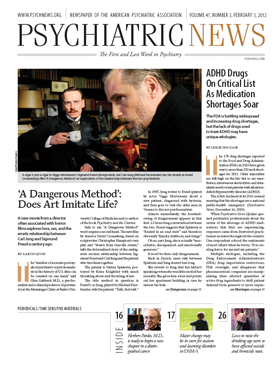Foster children were prescribed psychotropic drugs at rates that were 2.7 to 4.5 times higher than was the case for nonfoster children covered by Medicaid in 2008. To address the concerns raised by this finding, a government agency is urging the Department of Health and Human Services (HHS) to help close gaps in the oversight of psychotropic prescriptions and increase protections for these vulnerable children by endorsing best-practices guidance for states.
The findings and recommendations come from the Government Accountability Office (GAO), based on its recent examination of psychotropic prescriptions for foster and nonfoster children in 2008 and state oversight of psychotropic prescriptions for foster children through October 2011.
The GAO selected Florida, Maryland, Massachusetts, Michigan, Oregon, and Texas for their study, based primarily on geographic diversity and size of the foster-care population, but cautioned that results cannot be generalized to other states.
In addition, the GAO analyzed Medicaid fee-for-service and foster-care data from the selected states for 2008, the most recent year available at the start of the audit. (Maryland’s 2008 foster-care data were deemed unreliable for that portion of the analysis—a transition to a new records system in 2007 resulted in incorrect and missing data for foster children, according to Maryland state officials.)
To provide a clinical perspective on its methodology and analysis, the GAO contracted with Jon McClellan, M.D., an attending psychiatrist at the Seattle Children’s Hospital, a professor at the University of Washington School of Medicine, and medical director at Washington’s Child Study and Treatment Center, and with Michael Naylor, M.D., an associate professor of psychiatry at the University of Illinois at Chicago and director of its Division of Child and Adolescent Psychiatry.
Greg Kutz, director of audit services for GAO’s Forensic Audits and Investigative Service, discussed the GAO’s findings in an online interview and explained that the finding about antipsychotic prescription rates “doesn’t necessarily indicate inappropriate activity, as foster children oftentimes have significant trauma from neglect and physical abuse that results in more serious mental health conditions that then would tend to require psychotropic medication to treat them.”
What isn’t as easily explained, he said, are some of the higher-risk indicators that the GAO investigation uncovered, such as concomitant use of five or more psychotropic drugs in some children. “Our experts have told us that this is a potentially risky practice, something there’s no real clinical evidence to support,” said Kutz.
The GAO’s findings and concerns were backed up by another source, a report in the online November 11, 2011, Pediatrics. Susan dosReis, Ph.D., an associate professor in the Department of Pharmaceutical Health Services Research at the University of Maryland School of Pharmacy, and colleagues reported the results of their cross-sectional study of concomitant antipsychotic treatment among subgroups of youth in foster care.
Their sample consisted of 16,969 youth younger than age 20 who were continuously enrolled in a mid-Atlantic state Medicaid program and had one or more claims with a psychiatric diagnosis and one or more antipsychotic claims in 2003. Antipsychotic treatment was characterized by days of any use and concomitant use with two or more overlapping antipsychotics for more than 30 days.
“After controlling for psychiatric diagnosis, other psychotropic use, and demographic factors, youth who entered foster care were as likely to receive antipsychotics concomitantly for over 30 days as were disabled youth who typically have conditions for which antipsychotics are indicated,” found dosReis and colleagues. They concluded that although there might be a number of clinical decisions for using antipsychotics concomitantly that are not captured in administrative data, “concomitant antipsychotic use is not empirically supported.”
Overall, no one has asserted that these medications are not needed: “the lack of information on illness severity, treatment decisions, and clinical outcomes prohibits conclusions about the appropriateness of treatment,” wrote dosReis and colleagues, who urged the development of “longitudinal data … to determine if antipsychotic polypharmacy is preceded by failure of an adequate trial of monotherapy.”


